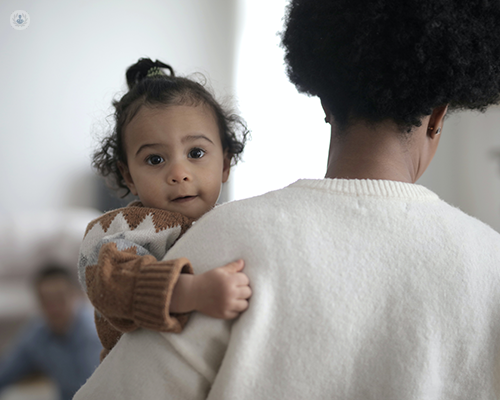Child allergies, immunodeficiencies and COVID: is my child safe?
Autore:Whether your child is at risk or not from allergies, immunodeficiencies and COVID depends on several factors. Dr Helen Brough, a consultant paediatric allergist, is on hand to provide you with her professional advice and reliable sources concerning your child’s health and COVID-19.

Why does COVID-19 affect children differently from adults?
Children generally make up for less than 2% of coronavirus COVID-19 (SARS‐CoV‐2) cases. What’s more, they generally tend to experience milder symptoms. From what we’ve seen, children are much less likely to be hospitalised or have fatal outcomes compared to adults when diagnosed with COVID-19. This is believed to be because:
- The SARS-CoV-2 virus enters the human cells via the receptor ACE2 (angiotensin-converting enzyme). Studies have shown that there are lower levels of ACE2 protein in children's serum and nasal epithelium compared to adults.
- Children may have a less severe form of the virus because they have fewer chronic health conditions than adults.
For a more detailed overview of this, you can view my article as chair of the Paediatric Section of the European Academy of Allergy and Clinical Immunology.
Are children with allergies considered a higher risk?
Children with allergies and immunodeficiency are generally not more likely to catch the disease. Also, allergic children show a mild form of symptoms if infected with SARS‐CoV‐2, which is similar to what children without allergies experience.
Does my child need to shield?
Certain groups of children who have an underlying condition may be considered extremely vulnerable and require shielding as outlined by the Royal College of Paediatrics and Child Health.
As things currently stand on the 24th October 2020, children and young people who are in primary care (regular and basic day-to-day healthcare from a healthcare provider) are very unlikely to be considered extremely vulnerable to severe COVID-19 symptoms.
The situation is changing all the time and it’s important to keep up to date with reliable information. I recommend the UK governments coronavirus guidance and support page.
It’s important to say that children who are in the vulnerable group should still attend hospital for essential treatment as recommended by their clinical teams (following a risk assessment).
Are children receiving immunosuppressive treatments more susceptible to COVID-19?
Primary immunodeficiency (PID) patients have been classified into three groups. Group A, B and C, with A being the most high risk. You can find advice on coronavirus for PID patients on the PID UK website.
Group A
Group A is the most high-risk group. These patients are extremely vulnerable.
If you are in group A, the UK government has guidance on shielding extremely vulnerable people.
Group A contains patients with immunodeficiency and immunosuppression
- Children who are at risk of severe COVID complications due to their primary immunodeficiency. Advice on this for parents is available from PIDUK.
- Children at risk of a severe infection due to immunodeficiency (either induced by their disease or their drugs as part of their therapy) i.e. some post-transplant immunosuppression, severe vasculitis. This means:
- Those on cyclophosphamide and high dose steroids (the dose may vary – check with your child’s specialist)
- It may include children who are clinically vulnerable during the period before and after transplants. The duration of immunosuppression may differ for solid organ transplants and stem cell transplants.
- Children with very specific immunosuppression as part of their cancer therapy.
Group B:
Patients in group B are at moderate risk
- Primary Immunodeficiency: Patients with more common primary immunodeficiencies such as IgA deficiency will not need to shield.
- HIV: Only children and young people who have a CD4 count less than 50 or who have had an opportunistic illness within the last six months are advised to shield (or who have one of the other conditions listed for which shielding is advised). It’s recommended that you discuss this with a specialist if in doubt.
- Severe asthma: Many children with asthma, including those treated with biological agents and daily prednisolone will not need continued shielding
Group C
This group is has a lower risk compared to Group A and B. Group C patients have a risk that is the same or only slightly higher than the general population.
Can stress from virus-related situations cause flare-ups in children with allergies?
In general but particularly during the pandemic, it needs to be recognised that socio-psychological aspects play a central role in the care of allergic patients. Stress caused may amplify the development of eczema or asthma.
Should children continue their treatments?
Yes. By continuing to use medication as prescribed, patients can reduce the need for unscheduled medical visits or emergency visits.
Eczema
Patients should continue using topical treatments to prevent flare-ups and eczema infections. Also, hand hygiene is key for preventing the spread of the virus, but extensive water contact enhances dry skin. To combat this, manage eczema by implementing effective skincare after hand hygiene to prevent skin barrier disruption and dry skin. Find out more on managing eczema.
Food allergy
With food allergies, it’s essential to continue managing food allergies by practising careful allergen avoidance to avoid accidental exposure to known food allergens. It’s also important to make sure you or your child has the correct and in date emergency medication on hand in case of an allergic reaction.
Asthma
Ensure your child’s asthma stays under control. Good asthma control is essential so that if the child gets infected with any virus, they don’t have a flare-up of their asthma. There is no evidence that inhaled steroids increase the risk of getting COVID-19, so patients should continue with all of their inhalers, including inhaled steroids (Clenil Modulite, Flixotide, Pulmicort) and inhaled steroids /long-acting beta-acting combination inhalers (e.g. Symbicort, Seretide, Relvar).
Also if your child is already on oral steroids, this should be continued. In the case of an asthma exacerbation, both parent and child should follow the personalised asthma action plan and, if indicated by a specialist, a course of oral steroids shouldn’t be ruled out.
In severe asthma, biologics already being used should be continued, but if a child catches COVID-19, biologics should be stopped while they have the infection.
Allergic rhinitis (hay fever)
Patients with allergic rhinitis (also known as hay fever) must continue their treatment. Uncontrolled allergic rhinitis increases the risk of touching the face and getting infected. Also, sneezing and coughing due to rhinitis could increase the risk of passing on COVID if they have caught the virus.
There is no evidence that antihistamines, nasal steroid sprays or immunotherapy to inhalant allergens increase the risk of catching COVID-19.
Chronic spontaneous urticaria
There is no increased risk of severe symptoms of COVID-19 symptoms for patients with urticaria. Also, the use of antihistamines does not increase the risk of catching the virus.
Severe allergic diseases
Currently, non‐infected patients on biologicals for the treatment of asthma, atopic dermatitis, chronic rhinosinusitis with nasal polyps or chronic spontaneous urticaria should continue their biologicals targeting type 2 inflammation.
In cases where a patient with a severe allergic disease catches the virus, biological treatment should be stopped until they have recovered and tested negative for the virus.
Dr Brough is on hand to help you look after your child’s health. Learn more about her paediatric allergist services and get in touch.


